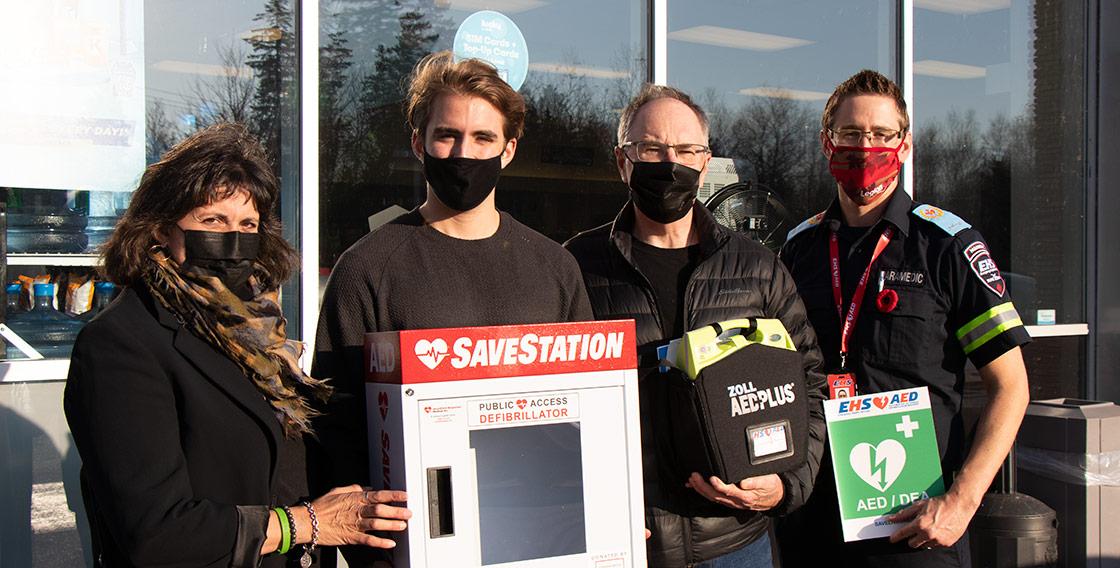
Left to right: Debbie Boyd, Bronson Beaton, Stephen Boyd and Mike Janczyszyn of EHS.
COVID was no more than a creative challenge for the QEII Foundation, the host organization of the Jordan Boyd Celebrity Hockey Challenge, who inspired friends and family of Jordan, pro hockey players and coaches alike to drop their sticks and pick up their golf clubs on July 29, 2021.
While participants walked away with many different prizes that day, Bronson Beaton, of Halifax, left with what was maybe the most unique prize on the course.
The 26-year-old aced a CPR test with Emergency Health Services (EHS), an event partner, who held an education session and CPR contest on one of the holes. His prize? An automated external defibrillator (AED) – a lifesaving device that restores heart function in a cardiac emergency.
“It was a surprise, for sure,” Bronson says, “I've participated in the event for six years and we won the trophy before, [including this year]. But I think this is the best prize that has ever come out of it. It was really fulfilling at the end of the day to be able to win something like that and donate it.”
Part of the deal was that Bronson select a location in Nova Scotia for the AED. The Springhill rink where he grew up playing hockey already has an AED, so he chose Oxford, a town nearby. The new device was installed at the Circle K on November 9, near the famous Blueberry Man just off the highway.
Bronson was at the Quebec Major Junior Hockey League (QMJHL) training camp in 2013 the day that Jordan lost his life to ARVC, an undiagnosed heart condition that often displays no symptoms.
Ever since, Jordan’s family has done remarkable work to ensure another family doesn’t have to live with what they have faced. The Boyd family has worked with the EHS AED Registry and others to place new AEDs in locations across Nova Scotia, from a New Glasgow farmer’s market to the Halifax Waterfront, a public park in Sydney and most recently, the Main St. Circle K in Oxford – and that’s just naming a few.
“We are so grateful every time we get to do this,” says Stephen Boyd, who, joined by his wife Debbie, met Mike Janczyszyn, coordinator of the EHS AED Registry, members of the QEII Foundation team, and Bronson for the installment. “If it’s ever needed, an AED has the power to save someone’s life.”
As part of his role, Mike trains people how to perform hands-only CPR and use AEDs. He says there are more than 1,300 AEDs registered across the province, but every additional one is a good thing.
Should you ever need the device “you recognize the event, call 911 and do CPR, supported by an AED. This is how you give someone the best chance of survival,” he says.
Through the Jordan Boyd Celebrity Hockey Challenge (and Golf Challenge in 2021), the Boyd’s have raised more than one million net for the QEII’s Inherited Heart Disease Clinic.
“We didn’t set out to raise a million dollars, but we did, and that’s pretty special. We are glad to do it and hope it makes a difference for people in Atlantic Canada,” says Stephen.
“Jordan was a humble guy, but he always wanted what was best for other people. I think he’d be pretty happy about the work being done in his name.” - Stephen Boyd
Funds raised through the event make extraordinary things possible. In 2016, the QEII’s Dr. Ciorsti MacIntyre traveled to the Mayo Clinic for a six-month fellowship, supporting vital inherited heart disease research at the QEII. The QEII’s Inherited Heart Disease Clinic acquired a full-time research nurse dedicated to ARVC and related heart conditions.
Activism and awareness are at the heart of everything the Boyd family is doing for people impacted by inherited heart disease. Among their successes is ensuring all bench staff on QMJHL teams are trained in CPR and AED use and that all participating athletes receive early screening for heart disease.
“My advice to parents who have kids that are very active in sports or are high-performance type athletes is to get an ultrasound of the heart,” Stephen says. “Doctors may not order one if there’s no obvious reason to do so. Even if you have to pay for it, it is worthwhile.”
To learn more about Jordan’s legacy, visit jordanboyd.ca.
For more on the EHS AED Registry, visit savelivesns.ca.